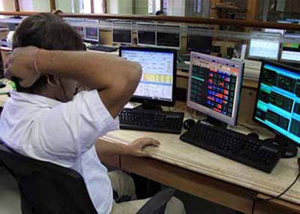Mumbai, Nov 9: Stock markets tumbled today with an estimated Rs 6 lakh crore getting wiped off from the invested wealth within seconds of opening trade as Sensex plunged 1,689 points on the US election trends showing lead for Donald Trump and the withdrawal of high-denomination notes worth billions.
 Rupee also lost value, but gold appeared to be a gainer as an investment option with sovereign gold bonds and gold- linked Exchange Traded Funds gaining ground as key non-cash instruments.
Rupee also lost value, but gold appeared to be a gainer as an investment option with sovereign gold bonds and gold- linked Exchange Traded Funds gaining ground as key non-cash instruments.
The Sensex opened sharply lower at 26251.38 points this morning and moved further down within seconds to touch a low of 25902.45 points -- down 1,689 points from its previous close -- with all 30 stocks from the benchmark index trading deep in the red.
Buying at lower levels, however, helped the Sensex to recover some lost ground in late morning trade. It was down nearly 975 points at 1100 hours.
The overall investors' wealth, measured in terms of valuation of all listed stocks, was down by nearly Rs 6 lakh crore in early morning trade from nearly Rs 111.44 lakh crore at the end of yesterday's trade.
Stocks from real estate and other cash-focussed sectors were hit the worst, while the major losers in the Sensex pack were Adani Ports, ICICI Bank, Hero MotoCorp, ITC, TCS, HDFC, Bajaj Auto, M&M, Maruti and Tata Steel.
Gail, Cipla, ONGC, Wipro, SBI, Asian Paints, L&T, Sun Pharma, RIL, Axis Bank, Dr Reddy's and Infosys were also down sharply.
The rupee turmoil continued as it slumped further by 28 paise to 66.90 against the US dollar in morning deals on the government's sudden action to ban on Rs 500 and Rs 1,000 currency notes in order to curb black money.
The domestic currency opened lower at 66.70 as against yesterday's closing level of 66.62 per dollar at the Interbank Foreign Exchange (Forex) market. Soon, it spiralled downward further and languished between 66.90 and 66.70 during morning deals. It was quoting 66.90 at 1045 hrs.
Meanwhile, the dollar index dropped by 2.06 per cent at 95.91 against a basket of six currencies in the early trade.
Taking cues from global markets, spooked domestic investors indulged in across the spectrum sell-off including in secondline shares of midcap and small companies. All the indices pack led by realty, consumer durables, financials, banks, IT, auto, metal, healthcare, power and industrials languished in massive selling.
The Sensex was trading at 26,604.02 in late morning deals, showing a drop of 987.12 points, or 3.58 per cent, from its last close. The 50-share Nifty was also slumped by 319.35 points, or 3.74 per cent, to quote at 8,224.20.
Key frontline shares all fell led by Adani ports 6.29 per cent, Heromotoco 6.13 per cent, ICICI Bank 5.93 per cent, HDFC 5.00 per cent and TCS 4.83 per cent. Foreign portfolio investors (FPIs) bought shares worth a net Rs 86.66 crore yesterday, as per provisional data.
Overseas, Asian markets slumped in volatile trading as investors await the outcome of the US presidential election, with early results showing Donald Trump capturing several states.
In US, stocks finished in positive territory for a second straight day, as gains in the consumer goods, utilities and telecoms sectors led shares higher.






Comments
Naren and Bhupa.....Hope you have not lost anything in shares ..... I am happy that I have nothing to lose in this share market.... I was in this trading but I quit the share market 10 years ago ....
i pity the doctors and vakils of coastal districts, who are members of sangha parivar have lost heavily in cash and share market
Mangana kaiyalli manikkya ...
acche din agaya..
Add new comment